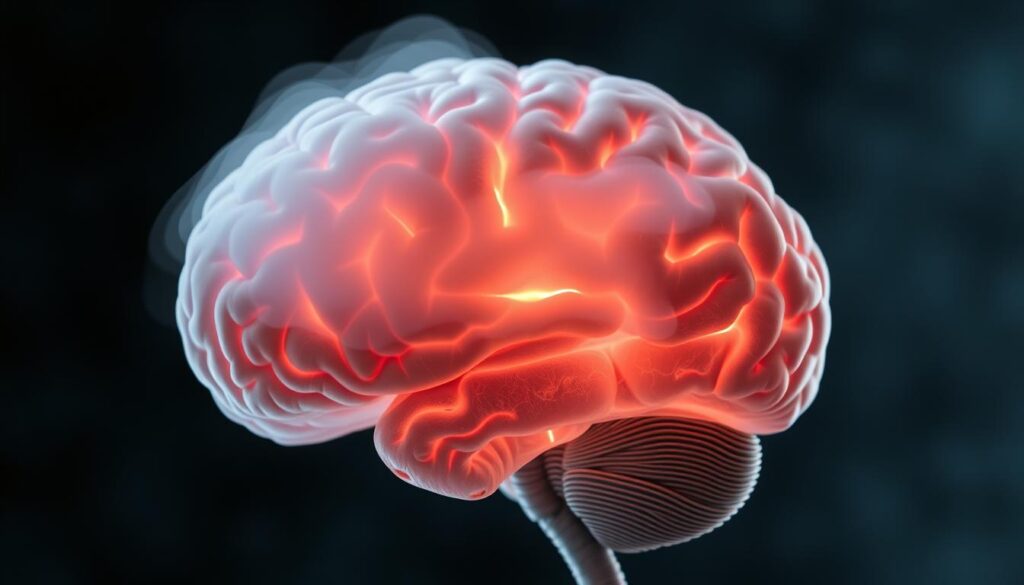
Ever walked into a room and forgotten why you went there? Or struggled to find words in a big conversation? Millions of Americans face brain fog every day. It makes them feel like they’re not thinking clearly.
Brain fog makes you feel sluggish and unfocused. Even simple tasks become hard when you’re foggy. It’s like your mind is stuck, making everyday life tough.Don’t let mental haze control your life any longer. Keep reading to find ways to clear your mind and boost your energy.
I’ve created a completely FREE guide, easy to understand, just for you. Inside, you’ll discover:
- Simple, science-backed daily routines that improve focus.
- Natural nutrition tips to support clear thinking.
My top product recommendations — carefully selected to truly help you.
Getting to know this foggy feeling is the first step to sharp cognitive thinking. It’s not just about forgetting things sometimes. It’s a real issue that needs real solutions.
Key Takeaways
- Brain fog affects millions of Americans through persistent mental cloudiness and reduced cognitive function
- Simple daily activities become challenging when experiencing mental fogginess and sluggish thinking
- This condition significantly impacts quality of life beyond occasional forgetfulness
- Mental haze can affect both personal and professional activities, requiring focus
- Understanding brain fog is the first step toward finding effective solutions
- Practical strategies exist to help restore cognitive clarity and mental sharpness
The Impact of Brain Fog on Cognitive Abilities and Daily Life
Brain fog affects how we cognitive think and perform daily activities. It makes it hard to work and connect with others. Simple tasks become a big challenge.
It’s not just about forgetting things. Brain fog messes with making decisions and enjoying life. People can’t stay productive or engaged in social activities.
Defining Brain Fog: How It Affects Cognition and Thinking
Brain fog makes our minds feel cloudy. It slows down how we process information. Unlike feeling tired, it’s a real brain problem. It’s not a medical condition itself but a symptom of other problems, often indicating cognitive dysfunction.
This condition messes with how our brain works. It makes it hard to think clearly and learn new things. Our brain can’t handle information as well.
Brain fog affects many parts of our brain, impacting cognitive abilities. It messes with planning and solving problems. This makes it hard to do anything that impacts cognitive abilities mentally.

Common Symptoms of Brain Fog
The set of symptoms of brain fog show up in many ways. Feeling mentally tired is common symptom. It’s not just from being tired, but from brain issues.
It’s hard to focus on tasks. Reading and talking become tough. People can’t concentrate for long.
Finding the right words is hard. This makes talking and writing hard. It can make people feel isolated.
Memory problems are a big issue. It’s hard to remember things. These brain fog symptoms can change throughout the day.
Brain Fog and Working Memory: Understanding Cognitive Challenges
Working memory is like a temporary storage for our brain. It helps us process and use information. Brain fog messes with this system, making it hard to function.When working memory is weak, it’s hard to follow instructions or solve problems. Simple tasks become overwhelming. The brain can’t handle the information needed to complete tasks.Brain fog and working memory problems create a cycle. As working memory gets worse, tasks take more mental effort. This leads to more mental fatigue, making it harder to think.
Studies show that working memory problems can lead to symptoms of brain fog. It’s hard to keep information in mind. This affects decision-making and learning.These problems hit hard in work settings. It’s hard to multitask or solve complex problems. Modern life demands more from our brains than we can give when working memory is weak.
Struggling to stay focused and energized? Learn how to take back control of your focus.
Many health issues lead to cognitive impairment by causing inflammation, hormonal shifts, and brain disruptions. These problems are the underlying cause of ongoing mental cloudiness. Understanding these connections helps both patients and doctors find the root of brain fog symptoms associated with brain fog.
Certain medical conditions and medications can cause brain fog, including brain injury, autoimmune diseases, infections, and chemotherapy.
Different conditions affect the brain in various ways. Some directly damage brain cells, while others disrupt chemical processes. It’s important to understand how these health problems lead to brain fog and find specific treatments.
COVID-19 and Long COVID: Cognitive Impairment and Brain Fog
COVID-19 has become a major
cause of brain fog worldwide. The virus canharm brain function during the illness and
for months after.
Studies show COVID-19 attacks brain
cells and triggers widespread inflammation.During active COVID-19, people often
feel confused, struggle with trouble concentrating, and memory issues.
The virus crosses the blood-brain barrier, causing neuroinflammation.
The immune response can also damage healthy brain tissue impacting cognitive
health. Long COVID poses even more
challenges for brain function. Research finds 20-30% of COVID-19 survivors have
lasting brain fog for six months or more.
This condition, known as “COVID brain,” affects people regardless of how severe their initial infection was.

- Persistent inflammation in brain tissue
- Damage to blood vessels supplying the brain
- Disruption of neurotransmitter systems
- Autoimmune responses affecting neural pathways
Recovery times vary greatly among patients. Some see improvement in months, while others face symptoms for over a year. Current treatments aim to manage inflammation and support brain health.
Chronic Conditions and Brain Fogginess
Many chronic health issues can cause brain fog through different biological pathways. These conditions lead to ongoing inflammation that hinders normal brain function. Understanding these connections helps patients grasp why their cognitive symptoms persist.
Chronic Fatigue Syndrome (CFS) is a common cause of severe brain fog. This complex disorder affects the central nervous system and energy production at the cellular level. Patients with chronic fatigue syndrome often find their cognitive symptoms more debilitating than physical fatigue.
CFS-related brain fog includes:
- Severe difficulty with word-finding
- Inability to process complex cognitive information
- Problems with short-term memory
- Reduced mental stamina and focus
Postural tachycardia syndrome (POTS) causes brain fog through blood flow disruption. This condition affects the autonomic nervous system, reducing blood flow to the brain when standing or sitting upright. The resulting cognitive symptoms can be severe and disabling.
Fibromyalgia patients often experience “fibro fog,” a specific type of cognitive impairment. This syndrome affects pain processing pathways in the brain, which overlap with areas responsible for memory and concentration. The chronic pain and sleep disruption associated with fibromyalgia further compound cognitive difficulties.
Chemotherapy treatments can cause significant brain fog in cancer patients. This condition, known as “chemo brain,” results from the toxic effects of cancer medications on healthy brain cells. The cognitive impairment can persist for months or years, often as fatigue following treatment completion.
Hormonal Changes and Menopause
Hormonal fluctuations significantly impact cognitive changes, especially during menopause. Estrogen plays a crucial role in brain function, supporting memory formation and neural communication. As estrogen levels decline, many women notice changes in their mental clarity.
Menopausal brain fog typically includes:
- Difficulty remembering names and words
- Problems with multitasking abilities
- Reduced mental processing speed
- Challenges with complex decision-making
The transition through perimenopause often brings the most severe cognitive symptoms. Hormone levels fluctuate unpredictably during this phase, creating inconsistent brain fog episodes. Some days feel mentally clear, while others bring significant cognitive challenges.
Research indicates that hormone replacement therapy can help some women manage menopause-related brain fog. However, treatment decisions require careful consideration of individual risk factors and health history. Alternative approaches include lifestyle modifications and cognitive training exercises.
Reduced mental processing speed. Problems finding the right words that make you feel foggy.
Thyroid disorders also create hormonal imbalances that affect cognitive function. Both hyperthyroidism and hypothyroidism can cause brain fog through different mechanisms. Proper thyroid hormone management often resolves these cognitive symptoms.
Mental Health and Cognitive Function
Mental health conditions and cognitive function share a complex, bidirectional relationship. This resource includes practical tips, treatment options, and lifestyle modifications that can help clear your mental haze and restore your cognitive clarity. Depression and anxiety can both result from and contribute to brain fog symptoms. This creates challenging cycles where cognitive difficulties worsen mental health, which then further impair thinking abilities.
Depression affects brain chemistry in ways that directly impact cognitive function. Reduced levels of neurotransmitters like serotonin and dopamine interfere with memory formation and concentration. The persistent negative thoughts associated with depression also consume mental resources needed for clear thinking.
Anxiety disorders create brain fog through constant worry and hypervigilance. The brain’s threat-detection systems remain chronically activated, diverting energy from higher-order thinking processes. This state of mental tension makes it difficult to focus on tasks or remember important information.
Chronic stress serves as another significant underlying cause of cognitive impairment. Elevated cortisol levels damage brain cells in areas responsible for memory and executive function. Long-term stress exposure can create lasting changes in brain structure and function.
Treatment approaches for mental health-related brain fog often include:
- Cognitive behavioral therapy techniques
- Stress management and relaxation training
- Medication to address chemical imbalances
- Lifestyle changes supporting brain health
The good news is that addressing underlying mental health conditions often leads to significant improvement in cognitive symptoms. Many people find that their brain fog lifts as their depression or anxiety becomes better managed.
Ready to clear your brain fog?
When to Talk to Your Doctor About Brain Fog Symptoms
Knowing when brain fog is more than just a temporary issue is key. Many people face occasional thinking problems. But if these issues keep happening and mess up your daily life, you should see a doctor. When you decide to talk to your doctor about brain fog, which can manifest as subjective cognitive impairment, having good notes and talking is key. Start by keeping a detailed diary of your symptoms for at least two weeks before your visit. They can tell if it’s just a normal brain glitch or something serious.
Some signs mean you should see a doctor right away. Look out for sudden and severe thinking problems, worsening memory issues, or thinking troubles with other symptoms like bad headaches, changes in your nervous system, or recent brain injury.

Distinguishing Brain Fog from Dementia
Many people worry about telling the difference between brain fog and dementia. It’s important because they have different causes, get worse in different ways, and need different treatments.
Brain fog is like a temporary thinking problem that can change from day to day. It might get better if you fix the cause. It usually affects specific areas, like focusing or finding words, not everything.
Dementia, on the other hand, is a serious condition that gets worse over time. It makes you forget recent things more than old ones, have trouble with everyday tasks, and change how you think or make decisions. Unlike brain fog, dementia symptoms don’t get better and get worse in a predictable way.
Age is also a big factor. Brain fog can happen to anyone, but dementia mostly affects older people. If you’re young and have thinking problems, it’s more likely to be something that can be fixed.
The Role of Neuropsychological Tests
Doctors often suggest a neuropsychological test to check how well your brain is working. While these tests are key, doctors might also use imaging like magnetic resonance imaging (MRI) or CT scans to rule out other problems. These images can show if there are any physical issues in the brain. These tests give a detailed look at your cognitive performance. They help doctors understand what’s going on with your brain.
A cognitive test checks things like attention, memory, and how fast you can process information. It takes a few hours and includes paper tests, computer tasks, and answering questions.
The results show what you’re good at and what you struggle with. This helps doctors make a plan to help you. It also helps figure out if you have other health issues and gives a starting point for future checks.
| Cognitive Domain | Tests Used | What It Measures | Clinical Significance |
| Attention | Trail Making Test, Digit Span | Focus and concentration abilities | Identifies attention deficits affecting daily tasks |
| Memory | Word List Learning, Story Recall | Learning and recall capabilities | Distinguishes memory types and severity |
| Executive Function | Wisconsin Card Sort, Stroop Test | Planning and problem-solving skills | Evaluates higher-order thinking processes |
| Processing Speed | Symbol Coding, Pattern Comparison | Mental processing efficiency | Indicates cognitive slowing or impairment |
Understanding Comorbidity and Multiple Symptoms
Comorbidity means having more than one health issue at the same time. Many people with brain fog have other health problems that make their thinking worse. It’s important to check for all of these issues.
Common health problems that can affect thinking include sleep issues, depression, anxiety, chronic pain, and autoimmune diseases. Each one can make thinking harder, but together they can make it even worse. This is why some people have really bad cognitive deficits, even if they don’t seem that bad on their own.
Doctors need to look at all these health issues together when making a treatment plan. Just treating one problem might not help much if there are others. A plan that looks at all of them usually works better.
Medicines can also play a part in comorbidity-related thinking problems. Some medicines can make thinking worse or interact with other medicines in bad ways. Checking your medicines regularly can help fix these problems.
Preparing for Your Medical Appointment
Getting ready for your doctor’s visit is important. When you decide to talk to your doctor about brain fog, having good notes and talking is key. This helps the doctor figure out what’s going on and how to help you.
Start by keeping a detailed diary of your symptoms for at least two weeks before your visit. Write down what thinking problems you have, when they happen, how long they last, and what might make them better or worse. Also, note how they affect your work, relationships, and daily life.
Make a list of all your current medicines, supplements, and any recent health changes. Include any family history of brain or mental health issues. This helps doctors understand if there might be a genetic link to your problems.
Prepare specific questions about memory problems and thinking issues. Ask about possible causes, tests, treatments, and how long it might take to get better. Also, ask about lifestyle changes that might help and when to come back for more checks.
Consider bringing a trusted friend or family member to your appointment. They can offer more insight into your cognitive complaints and help you remember important details. Having someone there also makes you feel less anxious and ensures nothing important is missed.
Finally, be honest about how brain fog affects your daily life. Many people don’t want to admit how much it’s impacting them. But telling the truth helps doctors understand how serious it is and plan the best treatment for you.
Solutions for Brain Fog and the Path to Cognitive Clarity
Brain fog is a big problem for millions of people of all ages and health levels. The first step to better thinking is to know that we can help our brain and address “brain fog”. This can be done through specific actions and changes in how we live.
Improving cerebral blood flow to the brain is key. This can be achieved by exercising regularly, staying hydrated, and managing stress. Many people see big improvements in their thinking by tackling issues like depression and anxiety. These conditions can make it harder to think clearly, creating a vicious cycle.
Doctors say we should take brain fog seriously and get help. It can be caused by many things, like long-term illnesses or changes in hormones. Finding and treating the main cause is crucial.
Getting better takes time and effort. Making small changes every day can lead to big improvements in how sharp we feel. It’s important to work with doctors to make sure any health issues are being treated.
Are you ready to feel more mentally clear? Start by picking one thing from this article to try this week. Maybe it’s time to see a doctor or connect with others who have overcome brain fog. Your journey to clearer thinking starts with just one step.
